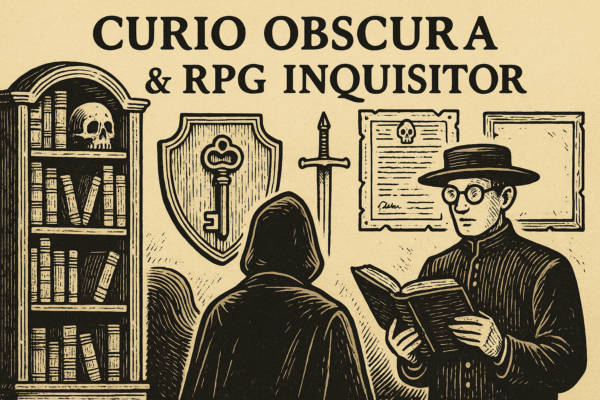There are games that teach. There are systems that enchant. And then there are worlds—built, maintained, and critiqued across dimensions by those who ask why this mechanic? with the same fervor others ask why this spell?
At the intersecting ley lines of game design and magical theory stand two companion towers: Curio Obscura, where we catalog the arcane and strange, and Gaming Graduate, where systems are studied, dissected, and occasionally applauded for their cruelty.
One dreams in artifacts. The other dreams in algorithms. Together, they form a fellowship of play, power, and perilous analysis.
What Is Gaming Graduate?
Gaming Graduate is your sardonic professor of interactive design. It offers:
- Deep analysis of tactical RPGs, deckbuilders, and emergent sim-worlds
- Systems criticism with literary flair and mechanical literacy
- Reviews that teach, essays that question, and breakdowns that elevate the medium
It’s where you go when you’re tired of reviews that say “looks great, plays fine” and crave something more nuanced—something written by someone who knows what ludonarrative dissonance actually means but doesn’t feel the need to use it in every sentence.
What We Share
Curio Obscura and Gaming Graduate are strange siblings. We may differ in tone—whimsical mysticism versus rigorous design theory—but we share a core set of principles:
| Shared Principle | Curio Obscura | Gaming Graduate |
|---|---|---|
| Lore literacy | Folklore, magic systems, in-world logic | Narrative theory, story-mechanic bonds |
| Worldbuilding focus | Fictional artifacts and rituals | Playable structures and encounter design |
| Obsession with form | Print, zines, tactile relics | UI/UX, mechanical friction, progression curves |
| Love for systems | Magical taxonomies | Game engines and resource economies |
| Dry wit, damp weather | Foxes and eldritch editors | Professors and broken tutorial loops |
Why You Might Cross the Bridge
If you enjoy Curio Obscura’s:
- Lore reviews of spellbooks and occult kits
- Fictionalized field notes from Sable Society members
- Magic system theory and in-world ritual analysis
…you’ll likely appreciate Gaming Graduate’s:
- Design dissections of titles like Into the Breach and Tactics Ogre
- Essays like “Emergent Failure and the Dungeonmaster’s Lie”
- Class and job system breakdowns that don’t assume you just want to play the rogue again
When Mechanics Become Magic
Many of our readers are worldbuilders, GMs, solo players, or writers of mythic fiction. But increasingly, they’re also:
- Game designers looking for narrative rituals
- Teachers using roleplay to model ideas
- Players who want to understand why they enjoy a certain feedback loop
Gaming Graduate offers frameworks for these inquiries—tools to diagnose the pleasure and pressure of play in ways that Curio Obscura has always quietly championed through magical metaphor.
Sample Portal Pairings
| Curio Obscura Post | Gaming Graduate Counterpart |
|---|---|
| Field Report: This Dice Set Is Cursed | How Randomness Actually Feels (and When It Shouldn’t) |
| A Guide to Books That Don’t Exist | Narrative Scaffolding in Systems-First Design |
| The Civic Report: Goose Mayor Incident | Designing for Chaos: When Rules Collapse |
| Grimoire Review: Everyday Spells Deck | Card-Based Clarity: On Tactical Tempo in Deckbuilders |
These aren’t just echoes. They’re alternate views of the same puzzle. One shaped in vellum, the other in code.
Closing the Codex
Curio Obscura documents the weird. Gaming Graduate explains the weird. Both believe there’s more to magic, and mechanics, than surface charm.
If you’ve ever built a campaign around the inventory menu from Darkest Dungeon, or if you’ve ever named your spellbook and given it feelings, you already belong to both worlds.
📚 Continue your descent into obscure artifacts here
🎮 Cross the threshold into design mastery at Gaming Graduate
Some of us draw sigils. Some of us draw flowcharts. And some of us—quietly, always—do both.


